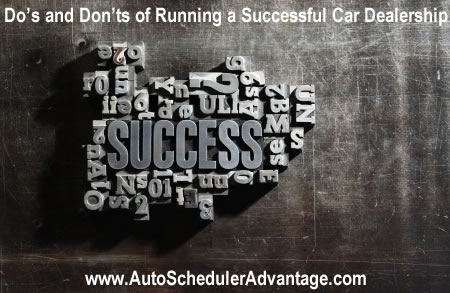 If you’re trying to do more than just stay afloat with your car dealership, you probably already know that you need a fantastic staff. You know that you have to pay attention to feedback and support your team, but you may not have thought of a few of these simple do’s and don’ts. Read on for some great tips for better car sales this year.
If you’re trying to do more than just stay afloat with your car dealership, you probably already know that you need a fantastic staff. You know that you have to pay attention to feedback and support your team, but you may not have thought of a few of these simple do’s and don’ts. Read on for some great tips for better car sales this year.
Do Get Your Sales and Service People Together
Your sales team depends on your service team to get the cars they’re selling in shape for demos. Your service team depends on your sales team to bring in repairs, maintenance, and upgrades that keep them in business.
The two departments have been separated for far too long. Service technicians are often kept in the back and never introduced to customers. It’s easy for a rift to open up and for the two departments to start working against each other. If you get them together in meetings and streamline your sales process so that they work more closely together, you’ll notice a lot of improvement.
Don’t Micromanage
You do want to be there for your employees, but you don’t want them to feel like you have your thumb in everything they’re doing or that they can’t make any decisions without your go-ahead. If you rob your staff of autonomy, you’ll make them feel as if they don’t have any ownership in their jobs or in the business. They’ll work just as much as they have to, and you’ll notice sales suffer.
Do Give Your Team Incentives
You’ll attract a whole lot more bees with honey than you will with vinegar. So get that honey flowing! Give small incentives for day-to-day great performance. Recognize when your team goes above and beyond the call of duty. Encourage them to give you feedback. When a suggestion is particularly effective, be sure that you give credit where credit is due.
Do Admit Your Faults
You’re going to mess up. Your staff is going to mess up. It happens in every business at some point or another. Be prepared to eat some humble pie when it does. Then learn from your mistakes and move on. Don’t let poop roll downhill, though it may be tempting to blame someone below you. Take responsibility and take care of issues as they arise. If you do this, your staff will come to trust and respect you, and they’ll take responsibility for their own shortcomings and make improvements on their own.